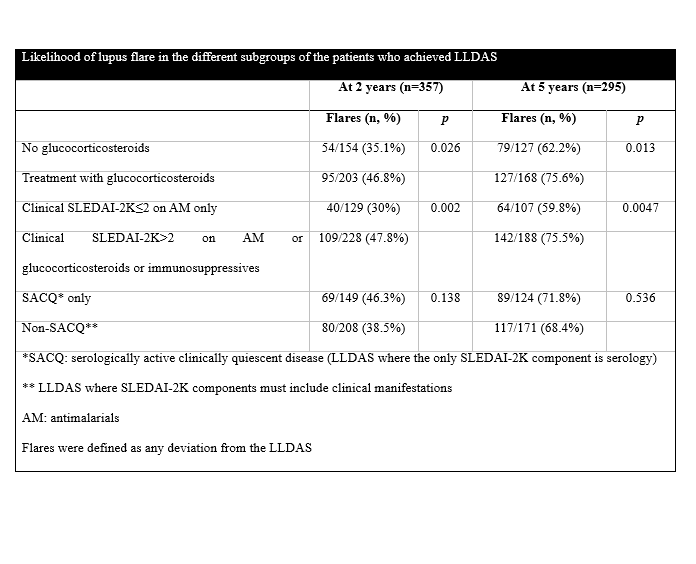Session Information
Session Type: Poster Session (Tuesday)
Session Time: 9:00AM-11:00AM
Background/Purpose: Lupus Low Disease Activity State (LLDAS) has been associated with favourable outcomes in systemic lupus erythematosus (SLE). However, the complexity of its defining criteria (SLEDAI-2K≤4, no major organ involvement, no new clinical manifestation, no increase in Physician’ s Global Assessment, daily prednisone dose≤7.5mg/day and stable doses of antimalarials, immunosuppressives and biologics) allows for considerable heterogeneity among these patients. The aim of the present study was to describe the major LLDAS phenotypes in inception patients first achieving LLDAS with emphasis on the likelihood of flare.
Methods: Inception patients from the Lupus Clinic (enrolled within 18 months since diagnosis) who achieved LLDAS for two consecutive visits from January 2000 to December 2016 were included. All patients were followed for at least two years and divided into major phenotypes as follows: glucocorticosteroid use (or not), clinical SLEDAI-2K≤2 on antimalarials only (or not) and serologically active clinically quiescent (SACQ) disease (or not). The likelihood of disease flare (any deviation from LLDAS) was assessed over the next 2 and then 5 years. SAS 9.4 was used for statistics; p< 0.05 was considered significant.
Results: Four hundred twenty one patients achieved LLDAS for two consecutive visits; 357 had at least two years and 295 had at least five years of follow-up. At two years, 149/357 (41.7%) patients flared after 1.1 years on average whereas at five years 206/295 (69.8%) patients flared after 1.9 years on average. The differences in the likelihood of flares are shown in the table.
Conclusion: Within the LLDAS population, patients who achieved a clinical SLEDAI-2K≤2 on antimalarials only as well as the patients who were not treated with glucocorticosteroids developed significantly less flares over 2 and 5 years. These findings suggest that the use of glucocorticosteroids or immunosuppressives and the nature of the clinical manifestations impact the ability of LLDAS to predict flares over the next 2 and 5 years.
To cite this abstract in AMA style:
Tselios K, Gladman D, Su J, Urowitz M. Do All Patients Who Achieve Lupus Low Disease Activity State Have Similar Outcomes? [abstract]. Arthritis Rheumatol. 2019; 71 (suppl 10). https://acrabstracts.org/abstract/do-all-patients-who-achieve-lupus-low-disease-activity-state-have-similar-outcomes/. Accessed .« Back to 2019 ACR/ARP Annual Meeting
ACR Meeting Abstracts - https://acrabstracts.org/abstract/do-all-patients-who-achieve-lupus-low-disease-activity-state-have-similar-outcomes/

